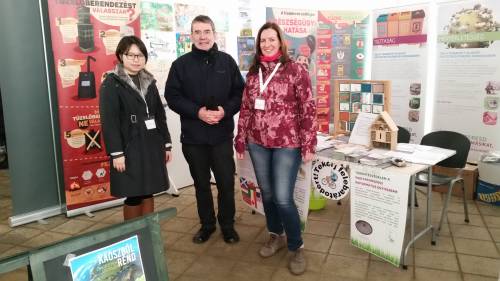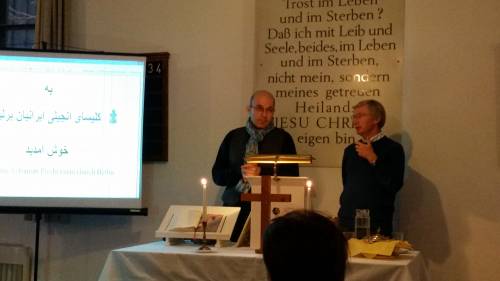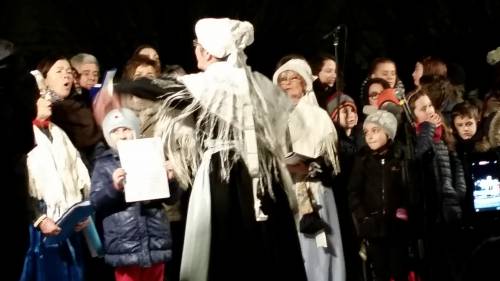A letter from Burkhard Paetzold serving in Germany
May 2017
Write to Burkhard Paetzold
Individuals: Give online to E200392 for Burkhard Paetzold’s sending and support
Congregations: Give to D506900 for Burkhard Paetzold’s sending and support
Churches are asked to send donations through your congregation’s normal receiving site (this is usually your presbytery).
Right away, Jesus reached out his hand. He helped Peter up and said, “You surely don’t have much faith. Why do you doubt?”—Matthew 14:31 CEV
Dear friends,
When times are troubling, some of us tend to be of little faith. Can we regain our faith by looking back into history to see that we have endured much more troubling times? Can we glean inspiration from history to be self-critical and search for reformative steps again and again to meet the challenges of today (semper reformanda)?

Burkhard visiting the booth of the Reformed Church in Hungary “eco-congregations” at the Debrecen Reformation Jubilee marketplace.
Europe is celebrating 500 years of Reformation. Luther published the 95 theses in Wittenberg, Germany, on October 31, 1517, but national churches with various reformed faith traditions in Europe use this symbolic 500-year anniversary to celebrate their specific movements and thus the large variety of reformation efforts and ideas: Jan Hus, the early reformer in Prague who was burned on the stake in 1415; the Waldensian Church in Italy with their reformation movement that dates as far back as the 12th century and finally led to their liberation in 1848; the reformation led by John Calvin in Switzerland and others. In January, the city of Debrecen together with the Reformed Church in Hungary celebrated the importance of the Reformation in the Hungarian Revolution of the 19th century.
This anniversary is celebrated at a time when civil society in Europe is once again discussing unity and diversity. It is celebrated in the time of Brexit and the dawn of countless populist movements. Europe has a long history of migration following religious and political persecution. In revisiting the Reformation, we discover that, at its best, it helped us strengthen an openness towards cultural diversity.
In 1685, Frederick William, the Great Elector of Prussia, invited in the Protestant Huguenots from France who were suffering persecution and being forced to re-Catholicize. The Prussian economy and culture got a boost from these refugees. Later rulers even created incentives for Huguenots to migrate and enlisted their help in containing, draining and developing settlements in the wetlands bordering the river Oder, right near where I live. Some of the villages that developed here during that time retain their French names.

Philip Woods, Europe and Middle East coordinator visits IPC in the Berlin-Rixdorf Bethlehem Church early February.
Groups of faith refugees of the Bohemian Brethren arrived in 1732 and 1737 in the city of Berlin and a small village near Berlin called Rixdorf. (Above I mentioned Jan Hus, their most well-known reformer, who had much earlier been burned at the stake). The movement that had developed after his death was oriented towards early Christianity, and over the centuries its adherents were forced to flee to neighboring Poland and Saxony. They finally arrived in Prussia, which at that time followed the rule of King Frederick II, “jeder soll nach seiner Fa-sson selig werden.” Each must live as he sees fit.
Berlin has grown much bigger since, and Rixdorf is now part of the district of Neukölln, one of the largest multiethnic districts in Berlin. That’s where the Bethlehem Church is located, a church founded by Bohemian Brethren refugees that honors their own history by hosting a contemporary migrant church, the Iranian Presbyterian Church (IPC), which is now served by PC(USA) mission coworkers Ryan and Alethia White. To learn more about the Whites, please visit their PC(USA) webpage.
Another church with a strong reformed faith tradition and a strong bond with the PC(USA) is the aforementioned Waldensian Church in Italy. The earliest recorded date of Waldensians immigrating to the US is 1650, and larger waves of Waldensian immigrants arrived in the 19th century. While a number of them stayed in New York, their point of arrival, others dispersed across the US. The Waldensian parishes were gradually absorbed into North American Protestant denominations, namely the Presbyterian Church. The largest and most distinctive community settled in North Carolina, founding a colony they named Valdese. By 1920, Valdese had flourished and become an industrialized town, with Waldensian descendants taking a leading role in the life of the place and supporting the Waldensian communities in Italy financially. See the American Waldensian website for more information on the Waldensians.

The choir the Waldensian Church in Pinerolo sings at the February 17 public celebration of the Waldensian Emancipation.
I was excited to get invited to the town of Pinerolo in the North of Italy for the February 17 celebration of the Waldensian Emancipation of 1848. After centuries of persecution, Waldensians in Italy were finally permitted to enjoy all the civil and political rights of Italian citizens as a result of the Emancipation. What excites me is that reforms in the Waldensian community led to a general emancipation of all Italians in society that was not only recognized but appreciated by the local and regional political leadership, civil society and Roman Catholic leaders.
We should be inspired by the Waldensian Church’s longstanding courage vis-à-vis a persecuting environment and their commitment to social justice and humanitarian affairs. The Waldensian Church is currently part of a supporting collaboration between the Federation of Protestant Churches in Italy (FCEI) and St. Egidio, a Roman Catholic movement committed to supporting refugees actively.
Mediterranean Hope, a project of the FCEI that is funded by the Waldensian Church, is coordinating Italy’s resettlement efforts for refugees from Lebanon, Morocco and Ethiopia. They call this resettlement program “Humanitarian Corridors,” for it is a safe alternative to risky and expensive boat travel. Families or single persons go through an interview process before an ecumenical group of doctors and psychologists recommends them to the Italian embassy, which, as an article from The Guardian explains, “issues humanitarian visas for a one-year stay during which they begin the asylum process for permanent resettlement.”
This autumn, Paola Schellenbaum, an international peacemaker from the Waldensian Church, is visiting the States to talk about the Presbyterian Peacemaking Program. Through visiting the Presbyterian Peacemaking Program’s webpage, you will find information on how to invite her or another international peacemaker to visit your church.
Do we have enough faith that programs like this will help more and more of those in need of refuge to cross the sea? Will we be able to invite others to follow the example of “Mediterranean Hope”? Why do we doubt?
To work with our partners in Germany, Hungary and Italy, and to connect with others in the PC(USA) who are located elsewhere, I need your helping hands. I am thankful for and request your encouragement, your prayers and your financial support.
Grace and peace,
Burkhard
![]() You may freely reuse and distribute this article in its entirety for non-commercial purposes in any medium. Please include author attribution, photography credits, and a link to the original article. This work is licensed under a Creative Commons Attribution-NonCommercial-NoDeratives 4.0 International License.
You may freely reuse and distribute this article in its entirety for non-commercial purposes in any medium. Please include author attribution, photography credits, and a link to the original article. This work is licensed under a Creative Commons Attribution-NonCommercial-NoDeratives 4.0 International License.